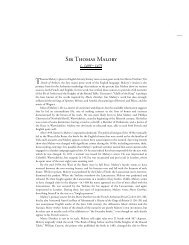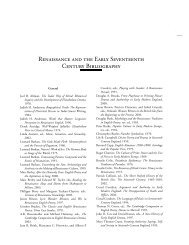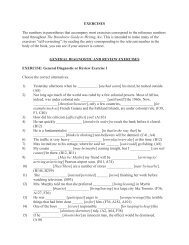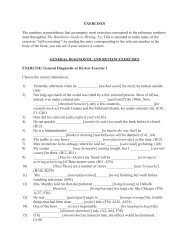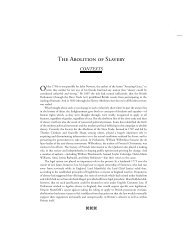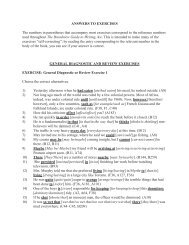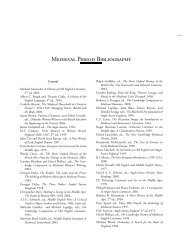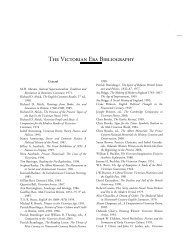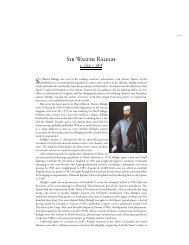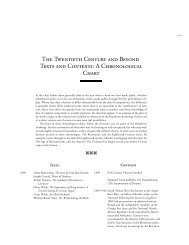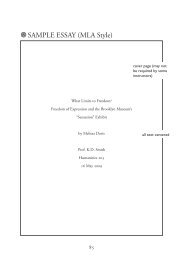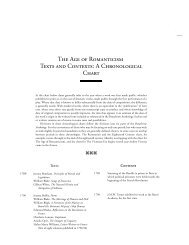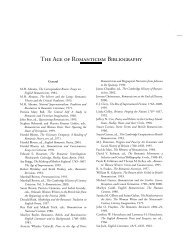Thomas Lodge - Broadview Press Publisher's Blog
Thomas Lodge - Broadview Press Publisher's Blog
Thomas Lodge - Broadview Press Publisher's Blog
You also want an ePaper? Increase the reach of your titles
YUMPU automatically turns print PDFs into web optimized ePapers that Google loves.
340<br />
345<br />
350<br />
355<br />
360<br />
365<br />
discoursing upon the nature of cicuta, 1 he gave diligent<br />
attention to his doctrine, and, finding out the<br />
simple, 2 he prepared the same according as he was<br />
instructed and presented it to his master’s son, a<br />
child of rare towardness, 3 who no sooner tasted<br />
thereof but with vehement and bitter agonies gave<br />
up the ghost. The father wonderfully astonished at<br />
this action and inquiring the cause of him with<br />
many pitiful bemoanings, he received this answer:<br />
“Master,” said he, “I have but put in practice<br />
that which you have taught me in precept, and<br />
since I find you a man of such credit, I will boldly<br />
write under your lesson probatum est.” 4<br />
He was naturally inclined to intort 5 all good<br />
principles of philosophy and to apply the earnest<br />
secrets of antiquity to notable insolency. He dissembled<br />
most holiness when he was irreligious,<br />
supposing it virtue to invent sin and shame to be<br />
ignorant in sin. His provident tutor knowing (as<br />
the proverb runneth) the tree by his fruit, the lion<br />
by his nail, and the crocodile by his tear; 6 knowing<br />
by daily experience that too much impunity is the<br />
cause of too much impiety; that it is easier to stop<br />
the river in the spring than withstand it in the<br />
stream; 7 that the lion restrained being a whelp is<br />
tractable in his greatest years; that custom was a<br />
mean, 8 if not to subdue, yet to alter nature, 9<br />
thought good by cruelty to correct that which by<br />
lenity he could not confound. 10 For which cause,<br />
seeing that gentle admonition prevailed nothing,<br />
1 cicuta another name for the common hemlock, an acutely poisonous<br />
plant.<br />
2 simple a plant or herb employed for medicinal purposes.<br />
3 towardness promise; natural aptitude in learning.<br />
4 Latin, “it has been proved.”<br />
5 intort twist, pervert.<br />
6 Proverbs, “Such as the tree is such is the fruit” (Tilley T494) and<br />
“Crocodile Tears” (C831). Traditionally, crocodiles were thought to<br />
weep tears either in order to allure men into their jaws or to “grieve”<br />
while devouring them; thus, the crocodile’s tears mark it as the type<br />
of hypocrisy.<br />
7 A variant on the proverb, “It is hard (folly, in vain) to strive against<br />
the stream” (Tilley S927).<br />
8 mean way.<br />
9 Cf. the proverb, “Custom (use) is another (a second) nature” (Tilley<br />
C932).<br />
10 confound defeat.<br />
T HOMAS L ODGE<br />
370<br />
375<br />
380<br />
385<br />
12<br />
he exchanged his strict persuasions to stern looks,<br />
his sound rudiments to sharp rigor, hoping to<br />
recover that by displing which he could not<br />
reform by discipline. 11 But as their labour is frustrate<br />
who seek to bring Caucasus into a plain, to<br />
bereave India of gems, Candia of oils, Cochim of<br />
pepper, or Hybla 12 of honey, so where the unreformable<br />
work of nature is grounded in peremptory<br />
wickedness, it is impossible either to destroy<br />
or disannul 13 the effects thereof, according to the<br />
opinion of the poet:<br />
Naturam expellas furca licet usque recurrit. 14<br />
For, giving him ordinary correction at one time for<br />
an erroneous 15 offence which he had committed,<br />
instead of submission and acknowledgment of his<br />
misdeeds he intentively employed himself to<br />
murder, and, finding his master one day asleep, he<br />
privily 16 took his penknife and cut his throat, smilingly<br />
concluding his impiety in this sort:<br />
Ille mihi feriendus aper. 17<br />
11 displing subjecting to discipline as bodily correction, penance, or<br />
punishment; discipline teaching, education, or instruction aimed at<br />
forming the pupil in proper conduct and action through mental and<br />
moral training.<br />
12 Caucasus an extremely high range of mountains running from the<br />
Black Sea to the Caspian (Topographical Dict., p. 107); Candia or Candy,<br />
otherwise known as the isle of Crete, famous in the period as a<br />
source of “currants, muscadells, and oils” (Topographical Dict., p. 96);<br />
Cochim Cochin, in the East Indies, a source of many spices in the<br />
period; Hybla a town in Sicily; Latin poets celebrated its honey (Topographical<br />
Dict., p. 259).<br />
13 disannul cancel, abolish, annul.<br />
14 Latin, “Even if you drive out nature with a pitchfork, yet she will<br />
always return” (Horace, Epistles, 1.10.24). This became a popular<br />
proverb in the period: “Though you cast out nature with a fork it will<br />
still return” (Tilley N50).<br />
15 erroneous morally faulty; criminal.<br />
16 privily secretly.<br />
17 Ovid, Metamorphoses, 3.715: “Now must I rend him [i.e., that wild<br />
boar]” (trans. F.J. Miller). So cries Agave, the mother of Pentheus,<br />
king of Thebes, before she and her fellow Bacchae (i.e., followers of<br />
the Bacchus, the god of wine) tear her son to pieces in a divinelyinspired<br />
frenzy, a punishment for Pentheus for denying Bacchus’<br />
divinity and spying on the god’s sacred rites, as well as a punishment<br />
for Agave for also denying Bacchus’ divinity. Agave and the others,



